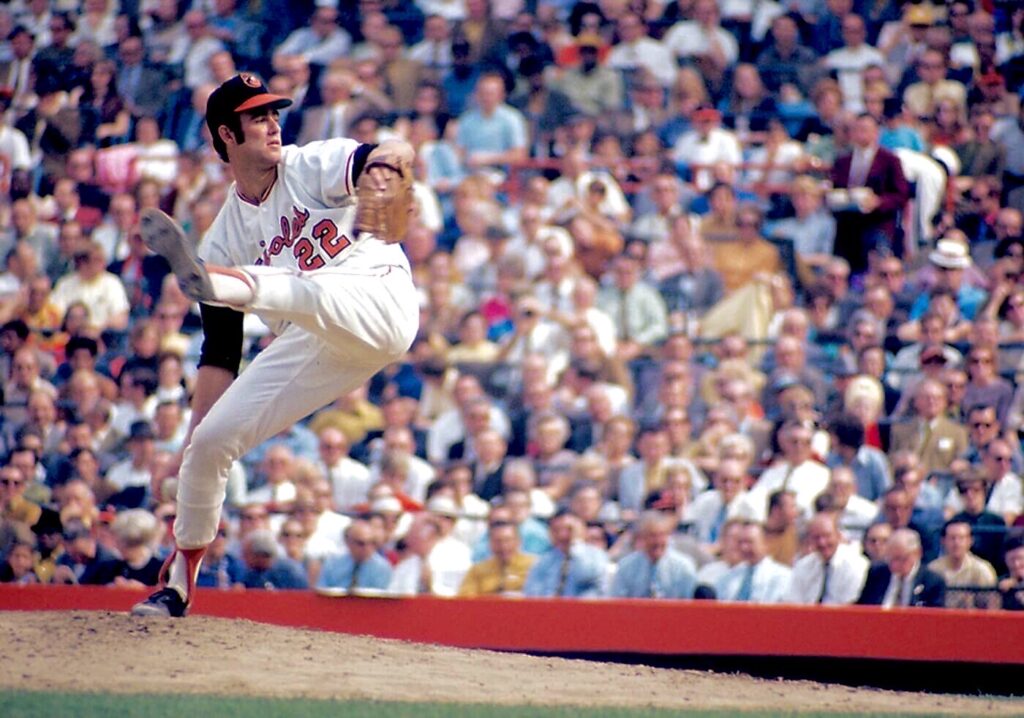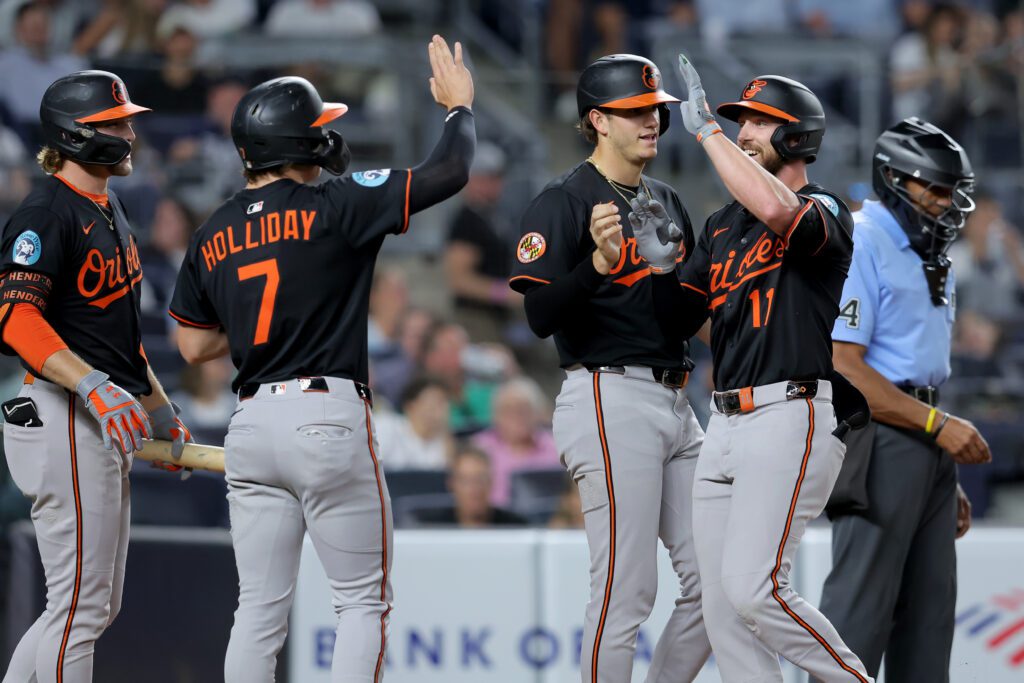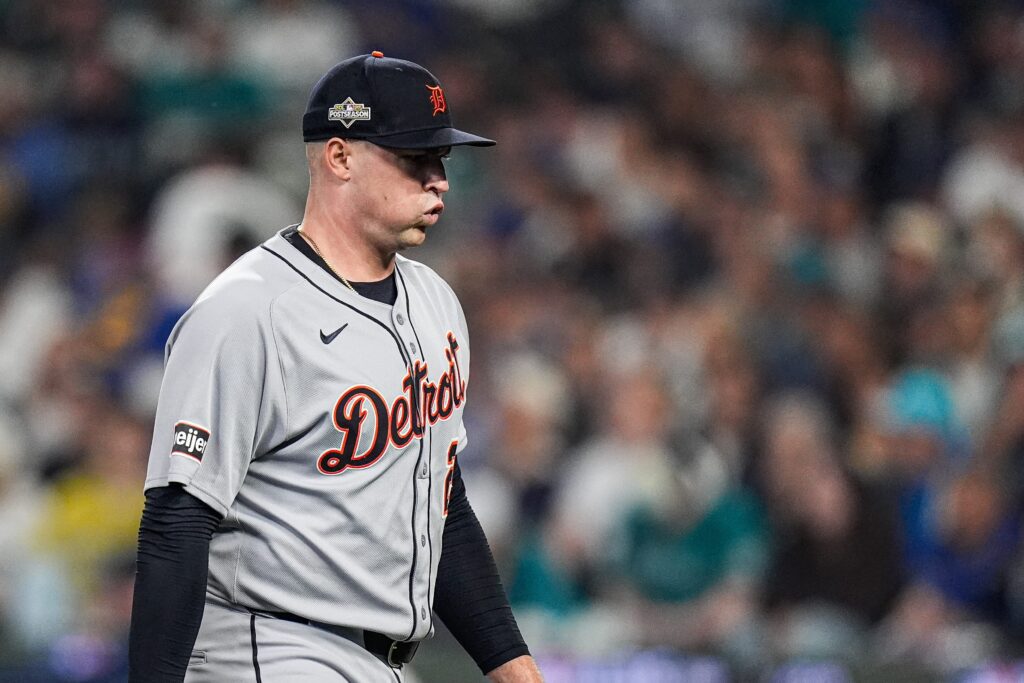This is the fifth and final article in a series that looks at the five best players at each position for the Baltimore Orioles. In this installment, right- and left-handed starters and relief pitchers.
The Baltimore Orioles had their most successful period from their first championship in 1966 to their most recent one in 1983. Pitchers from that era will feature prominently on these lists, with three righties, all five lefties, and two relievers who took the mound at Memorial Stadium during that time. Also, there are two Hall of Famers in this article, one from the period mentioned earlier and one from the 1990s.
The Best Pitchers in Baltimore Orioles History
Right-Handed Starters
Honorable Mention – Dennis Martinez began his career with the Orioles in 1976 and went 108-93 over the next 11 seasons. He posted a double-digit win total six times and led the American League with a 14-5 record in the strike-shortened 1981 season. Although he had a 15-16 record in 1979, Martinez led the league with 18 complete games and 292 1/3 innings. “El Presidente” ranks eighth in franchise history with 243 games started, ninth in innings (1,775), and tenth in strikeouts (858). He had postseason appearances with Baltimore but did not pitch during the 1983 World Series.
5. Milt Pappas – He ranks ninth in team history with a 110-74 record, and he reached double-digit victories in eight of his nine seasons with Baltimore. Pappas was a three-time All-Star who was not around for the Orioles’ first championship in 1966 after he was sent to the Reds in the Frank Robinson trade before the season. On the franchise list, Pappas ranks fifth in shutouts (26), sixth in strikeouts (944), and ninth in games started (232).
4. Jack Powell – Although he has a losing record with the Browns (117-143), his win total ranks eighth in team history and his 2.63 ERA ranks seventh. He went 22-17 with St. Louis in 1902 and posted a 1.77 ERA in 1906 (despite a 13-14 record), which is the second-lowest single-season mark in team history (Barney Pelty had a 1.59 ERA that same season). In addition to wins and ERA, Powell is high on the team list in other categories. He is second in complete games (210), fourth in innings (2,229 2/3) and shutouts (210), seventh in games started (264), and ninth in strikeouts (884).
3. Urban Shocker – The noted spitball pitcher went 126-80 in seven seasons with the Browns (1918-24), with his win total ranking seventh in franchise history. Shocker won at least 20 games in four straight seasons from 1920-23 and his 27-12 mark in 1921 both led the league and set a team record for victories in a season. He also led the league in strikeouts with 149 in 1922. Shocker is near the top on the franchise list in complete games (fifth with 143), shutouts (tied for sixth with 23), and innings (tenth with 1,749 2/3). After leaving the Browns, he was a member of the “Murderer’s Row” Yankees in 1927 but did not pitch during their World Series victory.
2. Mike Mussina – He ranks third in team history in wins (147-81), and he won 15 or more games six times, including a league-high 19 in 1995. Mussina sits second on the all-time Orioles list with 1,535 strikeouts, and he is the only pitcher in franchise history to fan 200 or more hitters three times. He was a five-time All-Star and a four-time gold glove winner who finished second in the 1999 Cy Young voting (to Pedro Martinez) after going 18-7. After starting the fifth-most games (288) and throwing the seventh-most innings (2,009 2/3) in team history, “Moose” signed a big contract with the division-rival Yankees in 2001. He pitched in two World Series with New York (losing efforts in 2001 and ’03) and finally reached the elusive 20-win mark, going 20-9 in his final season in 2008. Mussina was inducted into the Baseball Hall of Fame in 2019.
1. Jim Palmer – While Cal Ripken Jr. owns many of the franchise batting records, Palmer has that distinction on the pitching side. After a year as a reliever, he went 15-10 as a starter and outdueled Sandy Koufax during the Orioles’ sweep of the Dodgers in the 1966 World Series. Unfortunately, Palmer suffered from arm soreness that cost him most of the next two seasons. He returned in 1969, going 16-4 and throwing a no-hitter against the Athletics.
Palmer was nicknamed “Cakes” due to his pre-start ritual of eating pancakes, and that certainly helped him continue his dominance into the next decade. From 1970-78, he reached the 20-win mark eight times, leading the league three times and becoming the first pitcher in Major League history to win three Cy Young Awards (22-9 with a league-best 2.40 ERA in 1973, league-highs with a 23-11 record, a 2.09 ERA and 10 shutouts in 1975 and a league-leading 22-13 record and 315 innings with a 2.51 ERA in 1976).
In addition to the three Cy Youngs, Palmer earned six All-Star selections and four gold gloves. He retired in 1984 as the all-time franchise leader in wins (268-152), games pitched (558), games started (521), innings (3,948), strikeouts (2,212), complete games (211) and shutouts (53). Palmer pitched in all six of the team’s World Series appearances, going 4-2 and winning three championships. He was inducted into the Baseball Hall of Fame in 1990.
Left-Handed Starters
5. Steve Barber – He went 95-75 in eight seasons with the Orioles, reaching double-digits five times. Barber went 18-12 and led the league with eight shutouts in 1961. Two years later, he earned his first of two All-Star selections after posting his only 20-win season (he went 20-13 with a 2.75 ERA and 180 strikeouts). He went 10-5 and made the All-Star team in 1966 but did not pitch during Baltimore’s World Series victory. Barber ranks seventh in franchise history with 918 strikeouts and ninth with 19 shutouts.
4. Scott McGreggor – He was acquired from the Yankees in a 10-player trade in June of 1976 that also brought Tippy Martinez to Baltimore (more on him later). Over the next 13 years, McGreggor went 138-108 (the sixth-most wins in team history) and won 15 or more games four times. He went 20-8 with a career-high 118 strikeouts in 1980 but was an All-Star only once, the following year when he went 13-5 in the strike-shortened 1981 season. McGreggor went 3-3 in six career postseason starts and helped the Orioles beat the Phillies in the 1983 World Series. In addition to his franchise list win total, he also ranks fourth in games started (309), fifth in innings (2,140 2/3), tied for sixth in shutouts (23), and eighth in strikeouts (904).
3. Mike Flanagan – He took over from Palmer as the ace of Baltimore’s pitching staff and went 141-116 (the fifth-most wins in team history) during his 15-year tenure with the team (1975-87 and 91-92). Flanagan won at least 15 games five times and made his only All-Star appearance after posting a 19-15 record in 1978. However, it was the following season where Flanagan had his best result. He posted league-highs with a 23-9 record and five shutouts to go along with a 3.08 ERA and 190 strikeouts to earn the Cy Young Award.
Flanagan went 3-1 in six postseason games and was a part of the 1983 championship team. However, he tore his Achilles tendon during a charity basketball game before the 1985 season and never regained his early career success. Flanagan was traded to Toronto in 1987, came back to Baltimore in 1991, and retired after two more seasons with the Orioles. He finished third in franchise history in games started (328) and innings (2,317 2/3), fourth in strikeouts (1,297), and tenth in both complete games (98) and shutouts (17). Flanagan passed away in 2011 from an apparent suicide.
2. Mike Cuellar – He received a much-needed jolt when he was traded from Houston to Baltimore before the 1969 season. Over the next eight seasons (1969-76), Cuellar went 143-88, the fourth-highest win total in team history. He reached 20 wins four times and won 18 twice more. In his first season with the Orioles, Cueller went 23-11 with a 2.38 ERA and 182 strikeouts and won the Cy Young Award. The following year, he posted league-highs with a 24-8 record and 21 complete games to go along with 190 strikeouts. On the all-time franchise list, Cuellar ranks third in shutouts (30), fifth in strikeouts (1,011), and sixth in games started (283), innings (2,028 1/3), and complete games (133). The three-time All-Star went 4-4 in 12 postseason starts with the Orioles and pitched in three World Series, including the victory in 1970.
1. Dave McNally – Over his first six seasons, he went just 48-38, but he put it together in 1968, going 22-10 with 202 strikeouts and a 1.95 earned run average. McNally won at least 20 games in each of his next four seasons, tying for the league led in wins with a 24-9 mark in 1970 while finishing second to Jim Perry in the Cy Young voting. Overall, McNally ranks second team history in wins (181-113), innings (2,652 2/3), games started (384) and shutouts (33), third in strikeouts (1,476), fourth in games pitched (412) and seventh in complete games (120).
The three-time All-Star also went 7-4 in 14 postseason appearances, including 4-2 in four World Series. However, his biggest mark came off the field. After several contract disputes with the Orioles, McNally was traded to the Expos in 1975 and challenged the reserve system along with Dodgers pitcher Andy Messersmith. The two of them won the case and became free agents, but McNally had retired on June 9 and opted never to play again.
Relief Pitchers
5. Tippy Martinez – He came over from the Yankees with McGreggor in 1976 and over the next 11 seasons pitched in 499 games, the second-most in team history. Martinez was a durable reliever who threw at least 70 innings five times with the Orioles. He made his only All-Star team in 1983 when he went 9-3 with a 2.35 ERA and career highs with 21 saves and 81 strikeouts. He followed that with two saves in the World Series victory over the Phillies. Martinez went 52-40 and currently ranks fourth in team history with 105 saves.
4. Stu Miller – In an era long before the specialized relievers of today, Miller threw at least 80 innings in all five of his seasons with the Orioles (1963-67). In his first season, he had a 2.24 ERA, lead the league with 27 saves, and struck out 114 batters in 112 1/3 innings. Miller went 14-7 in 1965 and 9-4 the following year, but he did not pitch in the World Series victory over the Dodgers. Overall, Miller ranks third in team history with a 2.37 ERA and fifth with 99 saves.
3. Zack Britton – He was a two-time All-Star who had one of the most dominant three-year stretches of the 21st century. From 2014-16, Britton went 9-4 with a 1.38 earned run average, 120 saves, and 215 strikeouts in 209 innings. In 2016, he led the league with 47 saves and posted a nearly unhittable 0.54 ERA. However, his early career as a starter dropped his ERA to 3.22, but his 139 saves in eight seasons rank second in team history. Britton had two saves in six appearances during the 2014 playoffs.
2. Jim Johnson – Despite Britton’s dominant three-year run and higher save total, Johnson gets the higher spot on the list. He finished third with 122 saves, but he has the two highest single-season totals in team history. Johnson earned his only All-Star selection after posting a league-high 51 saves and winning the final Rolaids Relief Man Award in 2012. He added two saves in a loss to the Yankees in the Division Series. The following year, he again led the American League, this time with 50 saves. Johnson was traded to the Athletics after the season and never came close to regaining his dominant form over the final five years of his career, which was spent with five different teams.
1. Gregg Olson – The Orioles selected him fourth overall in the 1988 Draft and he chose to play for Baltimore instead of pitching for Team USA in the Olympics. After just 10 games in his first professional season, Olson was named Rookie of the Year after posting a 1.69 earned run average and 27 saves in 1989, which ended up being the lowest total in his five full seasons with Baltimore. The following year, he earned his only All-Star selection with a career-high 37 saves.
Over his Orioles career, Olson went 17-21 with a 2.26 ERA, 347 strikeouts in 350 1/3 innings, and a franchise-best 160 saves. However, he suffered a partially torn elbow ligament that caused Baltimore to release him and relegated him to middle relief over the next four years spent with six different teams. Olson had a bit of a resurgence with the expansion Diamondbacks in 1998-99, but he retired in 2001 after two lackluster seasons with the Dodgers.
Up next will be the Boston Red Sox
Previous Series
Baltimore Orioles Catchers and Managers
Baltimore Orioles First and Third Basemen
Baltimore Orioles Second Basemen and Shortstops
Baltimore Orioles Outfielders and Designated Hitters
A look back at the Atlanta Braves
Catchers and Managers
First and Third Basemen
Second Basemen and Shortstops
Outfielders
Pitchers
A look back at the Arizona Diamondbacks
Catchers and Managers
First and Third Basemen
Second Basemen and Shortstops
Outfielders
Pitchers



